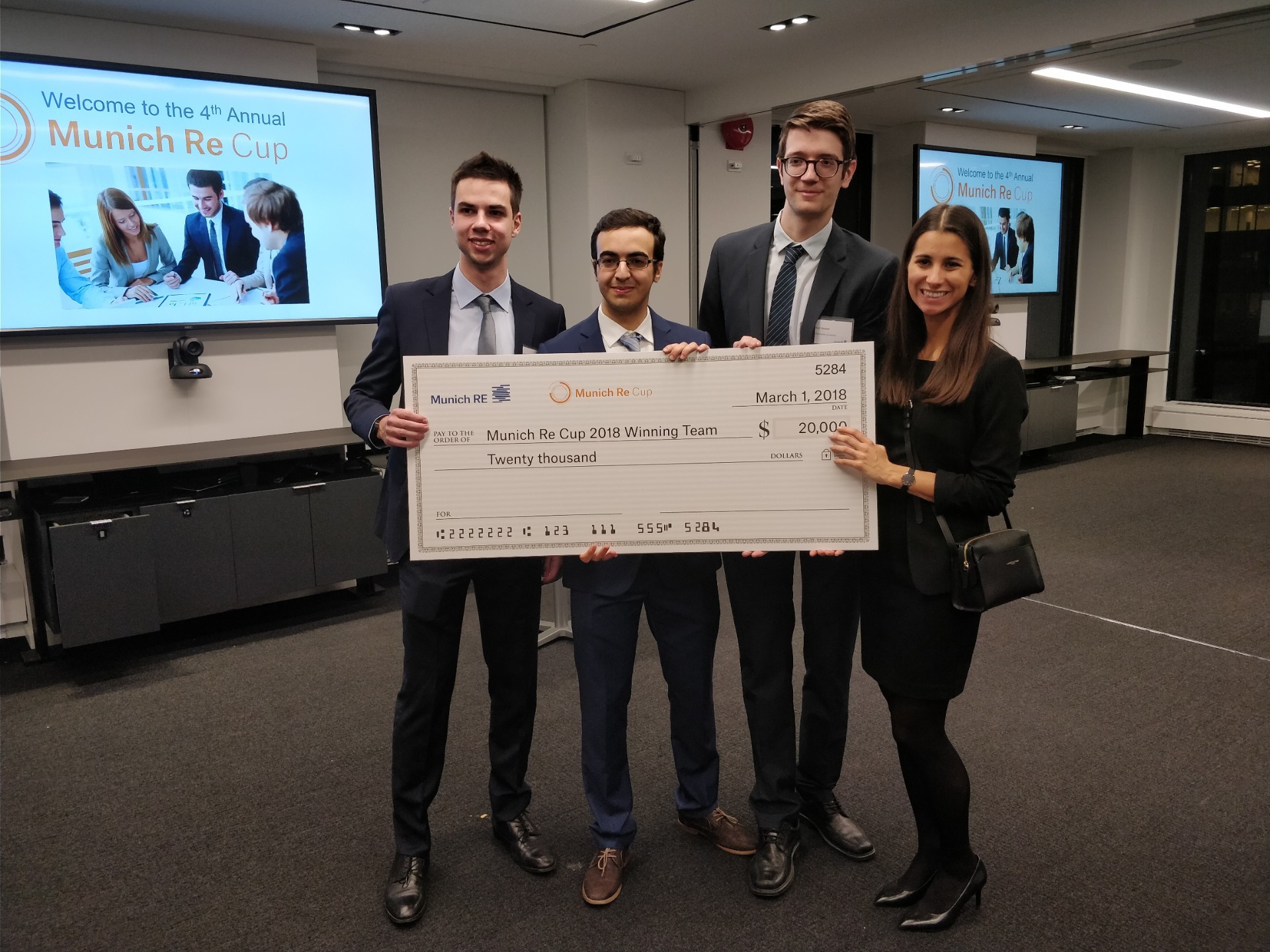Math / Stats wins big in national actuarial case competition
 Winners: William Duguay, Mohamed-Amine Mekideche, Karl Hansen, and Vanessa Mailhot-Franco.
Winners: William Duguay, Mohamed-Amine Mekideche, Karl Hansen, and Vanessa Mailhot-Franco.
A quartet of students from the Department of Mathematics and Statistics recently raked in $20,000, as winners of the fourth annual Munich Re Cup.
“When we heard our names [called out], we were all thrilled and proud of ourselves,” says actuarial student and team captain Vanessa Mailhot-Franco.
The Munich Re Cup — named after the reinsurance company — is a national actuarial case competition open to universities from the Society of Actuaries' Centers of Actuarial Excellence. Its goal is to give students a chance to utilize and develop their analytical, presentation and problem-solving skills. In teams, students find solutions to a real-world business problem and present it to a jury of experts.
This year, participants were asked to determine how a U.S.-based life insurer could use machine learning to support its objectives.
Together, students Mailhot-Franco, Mohamed-Amine Mekideche, William Duguay and Karl Hansen presented two possible solutions.
Mailhot-Franco and Mekideche are also both members of the Institute for Co-operative Education.
In analyzing the insurer’s data and research, the team used predictive analytics to develop an automatic process, where eligible applicants would no longer need to pass fluid and medical tests. To demonstrate this, they created an online website simulating the application process and the resulting incomes based on what users input.
They also used machine learning to develop a strategy to focus retention efforts on customers that are highly valuable.
“We demonstrated that, overall, these two solutions combined would allow the insurer to increase sales, lower expenses, increase customer lifetime value, and improve customer experience,” Mailhot-Franco says.
The group met twice per week during the six-week period given to complete the project, and also made time to work individually. Mailhot-Franco says tasks were delegated according to team members’ strengths.
“Two of our team members were very good at coding and building predictive models,” Mailhot-Franco explains. “My other teammate and myself took care of the business strategy and cost-benefit analysis.”
“We had very strong team chemistry,” she adds.
“The experience was without a doubt one of the highlights of my studies,” says Duguay. “The competition gave me the chance to work on central issues faced by the life insurance industry, and ways to implement realistic solutions using predictive analytics.”
Mekideche agrees. “It was a gratifying experience in which I improved my presentation and analytical skills and gained tremendous insights on the life insurance industry.”
The competition also came with opportunities for students to network amongst each other, with Munich Re executives and other industry professionals, which Hansen found particularly valuable.
“Everyone was passionate about their work and it was amazing to meet and talk with experts and fellow students on how innovative technologies are transforming the insurance industry,” he says.
Mailhot-Franco’s advises incoming participants to delegate tasks according to strengths, and show your work to other team members regularly to get insight on what could be improved.
“This experience taught me that effective team work is essential to achieve a common goal,” she says.
Concordia previously won the Munich Re Cup in 2016.
Learn more about the Department of Mathematics and Statistics.
Related links/articles:
Strategic Direction 3: Get Your Hands Dirty

